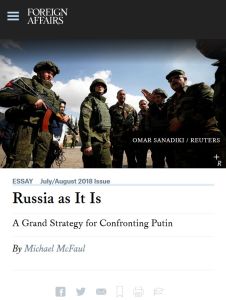Зарегистрируйтесь на getAbstract, чтобы получить доступ к этому краткому изложению.

Зарегистрируйтесь на getAbstract, чтобы получить доступ к этому краткому изложению.
Michael McFaul
Russia as It Is
A Grand Strategy for Confronting Putin
Foreign Affairs, 2018
Что внутри?
The United States needs a strategy to navigate the “hot peace” with Russia.
Recommendation
US-Russia relations began to sour in 2011, when large-scale, pro-democracy demonstrations reached the doorsteps of the Kremlin. Russian president Vladimir Putin blamed the United States and invoked nationalism to unite the Russian people against the perceived common enemy. According to former US ambassador to Russia, Michael McFaul, Russia’s subsequent annexation of Crimea marked the start of today’s “hot peace” between the former Cold War adversaries. He calls for new strategies to counter Russia’s threat to the global order. getAbstract suggests his article to readers who wonder how one country can work with another while keeping its distance.
Summary
About the Author
Michael McFaul is director of the Freeman Spogli Institute for International Studies at Stanford University. He served as the US ambassador to Russia from 2012 to 2014.














Comment on this summary